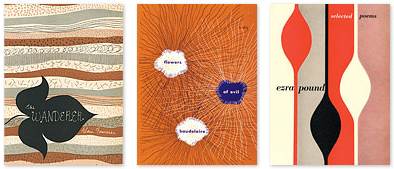Have a tough time choosing the right title for what you do? Design pioneer Alvin Lustig (1915-1955) felt your pain:
The words ‘graphic designer,’ ‘architect,’ or ‘industrial designer’ stick in my throat giving me a sense of limitation, of specialization within the specialty, or a relationship to society that is unsatisfactory and incomplete. This inadequate set of terms to describe an active life reveals only partially the still undefined nature of a designer.
Who is Lustig? He doesn’t get as much attention as some other influential designers, but his book designs revolutionized the field:
The current preference among American book jacket designers for fragmented images, photo-illustration, minimal typography and rebus-like compositions can be traced directly to Lustig’s stark black-and-white cover for Lorca, a grid of five symbolic photographs linked in poetic disharmony…
When Lustig’s approach was introduced to American book publishing in the late 1940s, covers and jackets were mostly illustrative and also rather decorative. Hard-sell conventions were rigorously followed. Lustig’s jacket designs entered taboo marketing territory through his use of abstraction and small, discreetly typeset titles, influenced by the work of Jan Tschichold. Lustig did not believe it was necessary to “design down,” as he called it, to achieve better sales.
Lustig even managed to continue designing after he went blind:
One of Lustig’s great strengths, which made it possible for him to continue to work despite his blindness, was his honed ability to visualize the problem before him in both two and three dimensions. Even at the end of his life he was actively designing everything he could, including advertisements, by dictating what he saw in his mind’s eye to his assistants who transcribed his words into concrete form.
There’s more interesting text about him and lots of work examples at alvinlustig.org.


RitaSue Siegel
on 26 Jun 07I had a summer job at Meridien Books, the company Alvin Lustig was designing books for when he was blind. It was owned by Arthur Cohen who married Lustig’s x-wife or widow, Elaine Lustig. It was a small company with a great cast of characters in what seemed to me at the time, a melodrama.
Very few blind people are totally blind. Most can see light and dark and other things I don’t know enough to write about. I had a good friend who was blind who taught me about this. He was a blind photographer.
This discussion is closed.